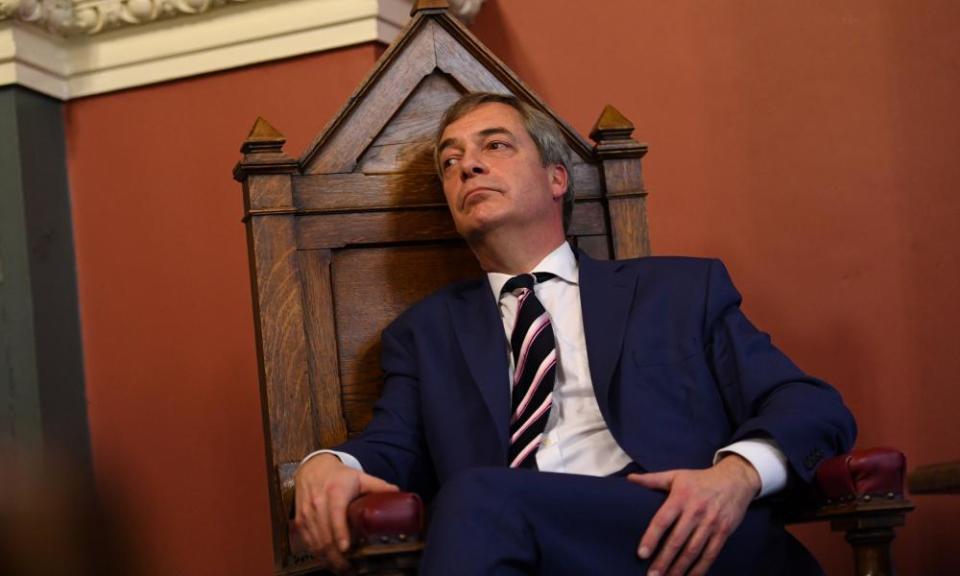Why Nigel Farage’s return could make a people’s vote more likely

Like Sinatra, Slim Shady and measles before him, Nigel Farage is back. Well, let’s be honest: he never really went away, did he? Since he stood down as Ukip’s acting leader in November 2016, a few days after his notorious meeting with the newly elected Donald Trump, he has rarely been off the airwaves. But now, as he revealed in the Daily Telegraph last week, he is going “back on the road to campaign once again”.
Under the banner of the Leave Means Leave campaign, there will be events, leaflets, street stalls, a battle bus and perhaps even a special-edition pledge card, with all your favourite bogus promises from two years ago, plus a host of new post-truth pledges. It is an exciting prospect: the “bad boys of Brexit” on the road once more, selling snake oil and lies wherever the freedom-mobile leads them.
Though Farage rarely needs an excuse to rush back into the limelight, he has found one. The prime minister’s Chequers plan amounts, he says, to “a set of ideas that are nothing more than a cowardly sellout”. Just as Trump has long raged against “crooked Hillary”, so Farage has taken to condemning “Theresa the appeaser”. You can tell he is chuffed with the pub-ready rhyme.
The very act of ‘restarting’ the campaign gives the impression that the 2016 result is provisional
To compound the Chequers betrayal, Farage claims, “George Soros-funded groups”, in alliance with “Tony Blair, Nick Clegg and others”, are plotting their own campaign in the autumn to suspend the article 50 process. He and his cronies will be further enraged by the news that the co-founder of Superdry, Julian Dunkerton, has donated £1m to the People’s Vote campaign for a fresh referendum on the final deal with Brussels.
Farage is ghastly rather than stupid, and he must know that there are risks attached to going back on the stump, to “restart the Brexit campaign”, as he put it on Sky News. The core of the leavers’ argument since the referendum has been that the matter was settled by the vote, that the public has issued unambiguous instructions, and that there is little more to discuss but the fine print of the divorce papers.
The former Ukip leader will, of course, claim that the whole purpose of his new campaign is to reinforce this core position, an itinerant pageant to put pressure on the government and parliament and to urge voters not to tolerate the great betrayal.

Yet the very act of – to use his own choice of verb – “restarting” the campaign will encourage the impression that the 2016 result is suddenly provisional, that the battle is not yet won, that there is all to play for. This is precisely the narrative that the People’s Vote campaign has been seeking to encourage: that nothing is inevitable, that true democracy is all about absorbing and responding to new information, that there is, in Dunkerton’s words, a “genuine chance to turn this around”.
Why, then, take this risk? Why does Farage not stick to his present course, a well-established irritant and self-appointed tribune of the forgotten masses, appearing on every television and radio show that will have him (which is plenty)? Because, as the scorpion tells the frog as he stings him while they are swimming across the stream, it is in his nature.
Populists survive by staying in motion. They are allergic to reflection, unable to stay still, naturally kinetic. They despise policy detail, nuance and pauses for thought. The essence of populism is not democracy, but the insistence that there are simple solutions to complex problems – solutions that are withheld from the public by a metropolitan elite of “saboteurs”, “enemies of the people” and consumers of carrot cake.
So while ministers and MPs fret over the practicalities of Brexit, the populist right keeps itself busy with less dull work. One of its most important projects, for instance, is the colonisation of the Tory party, which in its present parlous state is certainly vulnerable to entryism by former Ukip supporters and other nationalists. The hard Brexiters have seen how the left’s capture of Labour’s membership has transformed the party’s character and trajectory. If the populist right is to get the prime minister it wants after May, it needs its supporters to sign on the blue dotted line now.
But the main mission is, and remains, the campaign trail. This is where populists are happiest. Watch Trump at one of his rallies and compare his demeanour with his baffled hunch at diplomatic meetings. Compare Boris Johnson’s frequent irritation with official briefings as foreign secretary with his sheer elan when speaking to an auditorium. These politicians are showmen rather than statesmen. Just as the Trotskyites had the permanent revolution, they have the permanent performance.
And like the Party in Nineteen Eighty-Four, they see treachery everywhere. They seek power by claiming that the best interests of the people are being thwarted by a nebulous conspiracy. Indeed, they need the public to believe in that conspiracy so that they themselves are not held to account for their failure to deliver what they promised. When Jacob Rees-Mogg warns that the supposed benefits of Brexit may not be felt for half a century, he echoes the promise of millenarians down the ages – like the Jehovah’s Witnesses with their “new system”, the leavers cannot be precise about when, exactly, everything will be wonderful.
And, in a sense, the remoteness of the dream is the whole point. Nobody likes to be out of a job. Imagine if May, in a bedazzling change of form, suddenly delivered the hard Brexit that Farage wants: all “control” taken back, untrammelled self-government, immigration slashed, “pomp and circumstance” pumped by Tannoy into every British classroom. What on earth would he do with his time then?
• Matthew d’Ancona is a Guardian columnist

 Yahoo News
Yahoo News 